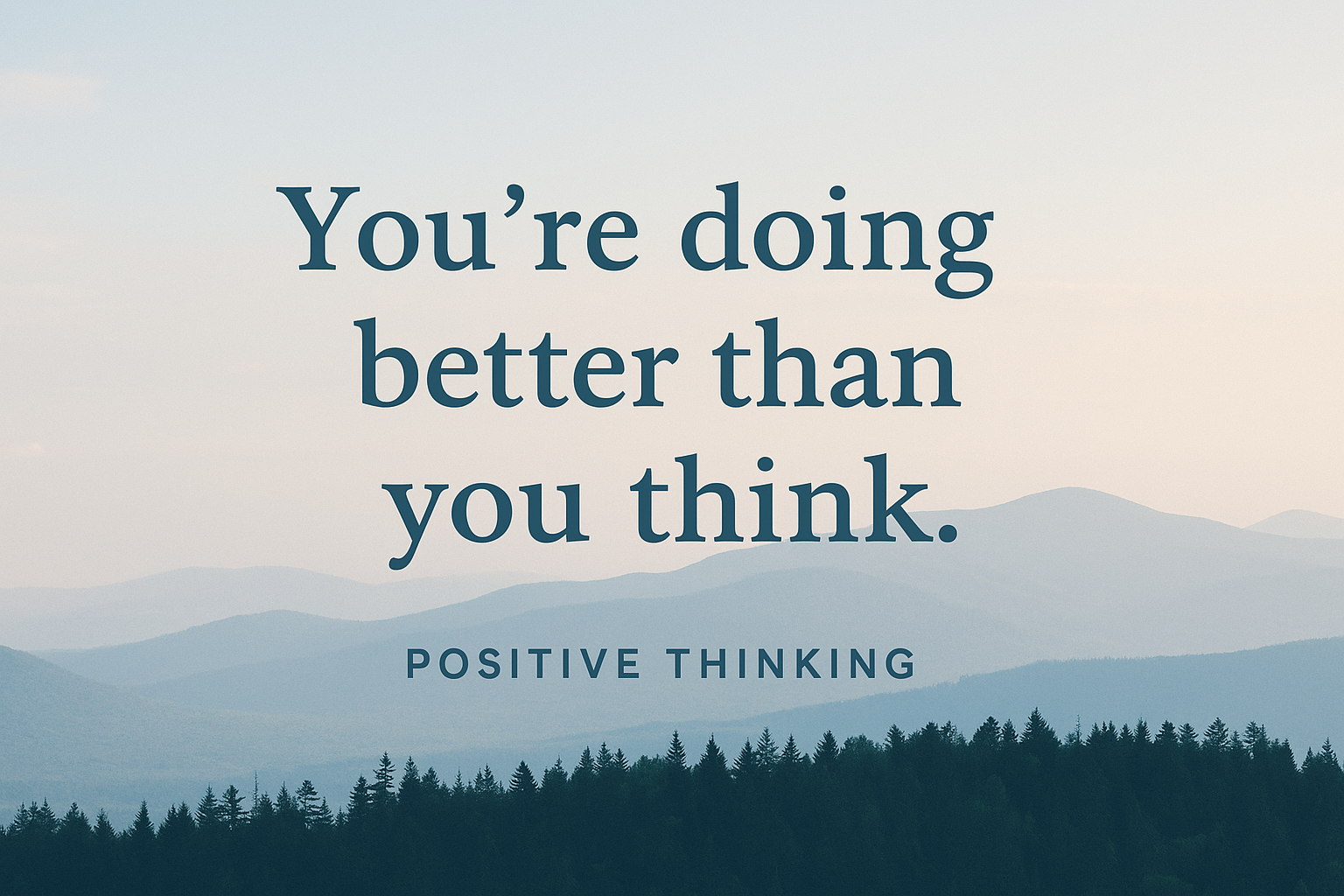06:57:33 pm 07/30/2025
Viewed: 5723
27 Ways You’re More Mentally Resilient Than You Think: A Guide to Positive Thinking and Action
In a world overwhelmed by bad news, rising stress levels, and uncertainty, it’s easy to feel like you’re not doing enough. But here’s the truth: if you’re already doing some of the things on this list, you’re far more well-adjusted and mentally resilient than you give yourself credit for.
Positive thinking isn’t about pretending everything is perfect—it’s about taking action, reframing your mindset, and building healthy routines that reinforce strength, not denial. Let’s dive into 27 signs you're already building a life of mental wellness—and how you can do more of it.
This is foundational. Psychologists call it adaptive coping—focusing your energy on solving the problems within your control while letting go of what you cannot influence. Acceptance is not surrender; it’s liberation. It’s the cornerstone of emotional intelligence (Goleman, 1995).
2. You Seek Out Uplifting News
Instead of doom-scrolling, you choose uplifting stories and positive media. This is not naïve—it's strategic. The capitalization effect (Langston, 1994) shows that sharing positive news boosts psychological well-being and enhances social connection.
3. You Resist Conspiracy Thinking
You fact-check, think critically, and stay grounded. Conspiracy theories prey on emotional vulnerability. According to a 2020 study in Nature, belief in conspiracies correlates with lower trust and increased anxiety.
4. You Listen to Experts, Not Echo Chambers
You trust scientific evidence and health authorities over social media influencers. Expertise matters—research in Cognitive Research: Principles and Implications shows that expert judgment consistently outperforms intuition in high-stakes decisions.
5. You Stay Connected to Loved Ones
Regular contact with positive people enhances resilience. A 2015 meta-analysis in Perspectives on Psychological Science confirmed that strong relationships are the single most important factor in long-term well-being.
6. You Use Music as Medicine
Music is mood medicine. Research in Frontiers in Psychology confirms that music activates neural pathways tied to memory, emotion, and creativity—improving mood and reducing cortisol.
7–8. You Laugh, You Learn, You Stream What Lifts You
Watching stand-up, sitcoms, podcasts, and webinars isn’t a waste—it’s an emotional reset. Laughter, according to Yale’s Emma Seppälä, “reduces stress hormones and boosts immune cells.” Humor is therapy.
9. You Keep Learning
Whether it’s a free MOOC or a YouTube tutorial, you stretch your brain. Lifelong learning enhances cognitive reserve and delays mental decline (Harvard Health, 2019).
10–11. You Journal and Problem-Solve
Journaling reduces emotional intensity and improves regulation (Smyth et al., 2002). Writing down problems, then brainstorming solutions, turns anxiety into action.
12. You Practice Mindfulness
Being present reduces anxiety and improves self-awareness. A 2018 study published in Mindfulness showed mindfulness practitioners had lower depression scores and better focus.
13–14. You Walk and Explore New Hobbies
Nature walks reduce rumination and lower cortisol (Bratman et al., 2015). Hobbies build confidence, spark creativity, and ward off burnout.
15–17. You Move, Dance, and Play
Exercise boosts endorphins. Dancing and singing with others (or alone) builds oxytocin—the bonding hormone. Movement literally changes your brain.
18. You Play Board Games
Games aren’t just fun. A 2019 review found board games enhance cognitive flexibility, memory, and social bonding—especially for older adults and kids alike.
19–20. You Give Back
Donating and volunteering provide a sense of purpose. Volunteering, according to The Journal of Happiness Studies, is correlated with lower depression and higher life satisfaction—especially when it aligns with your values.
21. You Aim to Be a Calming Presence
Rather than spread panic, you offer emotional stability. This is a skill. Emotional contagion is real—your calm helps others regulate, too.
22. You Write Creatively
Writing fiction or poetry improves introspection and helps process trauma. According to research from the University of Greater Manchester, expressive writing boosts emotional health.
23. You Prioritize Sleep
Sleep isn’t a luxury—it’s essential. Sleep affects mood, memory, and immune function. Sleep Medicine (2021) links poor sleep to anxiety, poor judgment, and depression.
24. You Practice Relaxation Techniques
From deep breathing to progressive muscle relaxation (PMR), you’ve found ways to self-soothe. These techniques reduce the sympathetic nervous system’s fight-or-flight response.
25–26. You Nourish Your Body and Manage Stress-Eating
You choose real food over processed comfort food. Nutrient-rich diets with magnesium, antioxidants, and healthy fats reduce brain inflammation and improve mental resilience (Rucklidge & Kaplan, 2013).
27. You Know When to Ask for Help
This may be the most important skill of all. It takes strength to admit you need support. Despite stigma, seeking help improves long-term outcomes (Australian Journal of Psychology, 2020).
Final Thoughts: You’re Already Doing More Than You Think
Mental wellness isn’t about being perfect or constantly upbeat—it’s about self-awareness, proactive effort, and having a toolkit you can return to when things get tough. As someone who personally values relevance and productivity, I’ve found that letting go of what I can’t control has been transformative. It might be the game-changer for you, too.
So pause. Breathe. Reread this list. You’re doing better than you think. And every small action you take is a victory for your future self.
Sources:
Langston, C. A. (1994). Capitalizing on and coping with daily-life events: Expressive responses to positive events. Journal of Personality and Social Psychology.
Goleman, D. (1995). Emotional Intelligence.
Rucklidge, J. J., & Kaplan, B. J. (2013). Nutrition and mental health: Clinical implications.
Bratman, G. N., et al. (2015). Nature experience reduces rumination and subgenual prefrontal cortex activation.
Seppälä, E. (2014). The happiness track. Yale University.
Sleep Medicine (2021). Impact of sleep on mood and cognition.
Frontiers in Psychology (2018). Effects of music on the brain.
Journal of Happiness Studies (2020). Volunteering and mental health.
Australian Journal of Psychology (2020). Barriers to seeking psychological help.
In a world overwhelmed by bad news, rising stress levels, and uncertainty, it’s easy to feel like you’re not doing enough. But here’s the truth: if you’re already doing some of the things on this list, you’re far more well-adjusted and mentally resilient than you give yourself credit for.
Positive thinking isn’t about pretending everything is perfect—it’s about taking action, reframing your mindset, and building healthy routines that reinforce strength, not denial. Let’s dive into 27 signs you're already building a life of mental wellness—and how you can do more of it.
1. You Change What You Can—And Accept What You Can’t
This is foundational. Psychologists call it adaptive coping—focusing your energy on solving the problems within your control while letting go of what you cannot influence. Acceptance is not surrender; it’s liberation. It’s the cornerstone of emotional intelligence (Goleman, 1995).
2. You Seek Out Uplifting News
Instead of doom-scrolling, you choose uplifting stories and positive media. This is not naïve—it's strategic. The capitalization effect (Langston, 1994) shows that sharing positive news boosts psychological well-being and enhances social connection.
3. You Resist Conspiracy Thinking
You fact-check, think critically, and stay grounded. Conspiracy theories prey on emotional vulnerability. According to a 2020 study in Nature, belief in conspiracies correlates with lower trust and increased anxiety.
4. You Listen to Experts, Not Echo Chambers
You trust scientific evidence and health authorities over social media influencers. Expertise matters—research in Cognitive Research: Principles and Implications shows that expert judgment consistently outperforms intuition in high-stakes decisions.
5. You Stay Connected to Loved Ones
Regular contact with positive people enhances resilience. A 2015 meta-analysis in Perspectives on Psychological Science confirmed that strong relationships are the single most important factor in long-term well-being.
6. You Use Music as Medicine
Music is mood medicine. Research in Frontiers in Psychology confirms that music activates neural pathways tied to memory, emotion, and creativity—improving mood and reducing cortisol.
7–8. You Laugh, You Learn, You Stream What Lifts You
Watching stand-up, sitcoms, podcasts, and webinars isn’t a waste—it’s an emotional reset. Laughter, according to Yale’s Emma Seppälä, “reduces stress hormones and boosts immune cells.” Humor is therapy.
9. You Keep Learning
Whether it’s a free MOOC or a YouTube tutorial, you stretch your brain. Lifelong learning enhances cognitive reserve and delays mental decline (Harvard Health, 2019).
10–11. You Journal and Problem-Solve
Journaling reduces emotional intensity and improves regulation (Smyth et al., 2002). Writing down problems, then brainstorming solutions, turns anxiety into action.
12. You Practice Mindfulness
Being present reduces anxiety and improves self-awareness. A 2018 study published in Mindfulness showed mindfulness practitioners had lower depression scores and better focus.
13–14. You Walk and Explore New Hobbies
Nature walks reduce rumination and lower cortisol (Bratman et al., 2015). Hobbies build confidence, spark creativity, and ward off burnout.
15–17. You Move, Dance, and Play
Exercise boosts endorphins. Dancing and singing with others (or alone) builds oxytocin—the bonding hormone. Movement literally changes your brain.
18. You Play Board Games
Games aren’t just fun. A 2019 review found board games enhance cognitive flexibility, memory, and social bonding—especially for older adults and kids alike.
19–20. You Give Back
Donating and volunteering provide a sense of purpose. Volunteering, according to The Journal of Happiness Studies, is correlated with lower depression and higher life satisfaction—especially when it aligns with your values.
21. You Aim to Be a Calming Presence
Rather than spread panic, you offer emotional stability. This is a skill. Emotional contagion is real—your calm helps others regulate, too.
22. You Write Creatively
Writing fiction or poetry improves introspection and helps process trauma. According to research from the University of Greater Manchester, expressive writing boosts emotional health.
23. You Prioritize Sleep
Sleep isn’t a luxury—it’s essential. Sleep affects mood, memory, and immune function. Sleep Medicine (2021) links poor sleep to anxiety, poor judgment, and depression.
24. You Practice Relaxation Techniques
From deep breathing to progressive muscle relaxation (PMR), you’ve found ways to self-soothe. These techniques reduce the sympathetic nervous system’s fight-or-flight response.
25–26. You Nourish Your Body and Manage Stress-Eating
You choose real food over processed comfort food. Nutrient-rich diets with magnesium, antioxidants, and healthy fats reduce brain inflammation and improve mental resilience (Rucklidge & Kaplan, 2013).
27. You Know When to Ask for Help
This may be the most important skill of all. It takes strength to admit you need support. Despite stigma, seeking help improves long-term outcomes (Australian Journal of Psychology, 2020).
Final Thoughts: You’re Already Doing More Than You Think
Mental wellness isn’t about being perfect or constantly upbeat—it’s about self-awareness, proactive effort, and having a toolkit you can return to when things get tough. As someone who personally values relevance and productivity, I’ve found that letting go of what I can’t control has been transformative. It might be the game-changer for you, too.
So pause. Breathe. Reread this list. You’re doing better than you think. And every small action you take is a victory for your future self.
Sources:
Langston, C. A. (1994). Capitalizing on and coping with daily-life events: Expressive responses to positive events. Journal of Personality and Social Psychology.
Goleman, D. (1995). Emotional Intelligence.
Rucklidge, J. J., & Kaplan, B. J. (2013). Nutrition and mental health: Clinical implications.
Bratman, G. N., et al. (2015). Nature experience reduces rumination and subgenual prefrontal cortex activation.
Seppälä, E. (2014). The happiness track. Yale University.
Sleep Medicine (2021). Impact of sleep on mood and cognition.
Frontiers in Psychology (2018). Effects of music on the brain.
Journal of Happiness Studies (2020). Volunteering and mental health.
Australian Journal of Psychology (2020). Barriers to seeking psychological help.
No video exists.





Comments